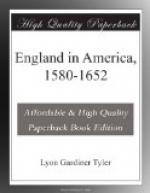Thus having temporarily settled their differences, the leaders divided the immigrants into three parties, retaining one under Smith at Jamestown, and sending another under John Martin to Nansemond, and a third under Francis West to the falls of the James River. The Indians so fiercely assailed the two latter companies that both Martin and West soon returned. Smith was suspected of instigating these attacks, and thus fresh quarrels broke out. About the time of the expiration of his presidency Smith was injured by an explosion of gunpowder, and in this condition, exasperated against Martin, Archer, and Ratcliffe of the former council, he would neither give up the royal commission nor lay down his office; whereupon they deposed him and elected George Percy president.[17] When the ships departed in October, 1609, Smith took passage for England, and thus the colony lost its strongest character. Whatever qualifications must be made in his prejudiced account of the colony, the positions of trust which he enjoyed after reaching home prove that his merit does not rest solely upon his own opinions.
Under Percy the colony went from bad to worse. Sickness soon incapacitated him, and his advisers, Martin, Archer, Ratcliffe, and West, were not men of ability. Probably no one could have accomplished much good under the conditions; and though it became fashionable afterwards in England to abuse the emigrants as a “lewd company” and “gallants packed thither by their friends to escape worse destinies at home,” the broadsides issued by the company show that the emigrants of the “Third Supply” were chiefly artisans of all sorts.[18] The Rev. William Croshaw perhaps stated the case fairly in a sermon which he preached in 1610,[19] when he said that “those who were sent over at the company’s expense were, for aught he could see, like those that were left behind, even of all sorts, better and worse,” and that the gentlemen “who went on their own account” were “as good as the scoffers at home, and, it may be, many degrees better.”
The colonists at first made various efforts to obtain supplies; and at President Percy’s command John Ratcliffe, in October, 1609, established a fort called Algernourne and a fishery at Point Comfort, and in the winter of 1609-1610[20] went in a pinnace to trade with Powhatan in York River; but was taken off his guard and slain by the Indians with twenty-seven of his men.[21] Captain West tried to trade also, but failing in the attempt, sailed off to England.[22] Matters reached a crisis when the Indians killed and carried off the hogs, drove away the deer, and laid ambushes all around the fort at Jamestown.[23]
Finally came a period long remembered as the “Starving Time,” when corn and even roots from the swamps failed. The starving settlers killed and ate the dogs and horses and then the mice and snakes found about the fort. Some turned cannibals, and an Indian who had been slain was dug out of the ground and devoured. Others crazed with hunger dogged the footsteps of their comrades; and one man cut his wife into pieces and ate her up, for which barbarous act he was executed. Even religion failed to afford any consolation, and a man threw his Bible into the fire and cried out in the market-place, “There is no God in heaven.”




